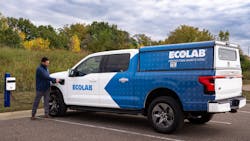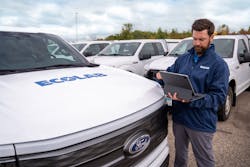Scaling up: Ecolab to electrify fleet with Ford Pro
Global sustainability leader Ecolab, which boasts a century-long business relationship with Ford, has selected Ford Pro to accelerate the electrification of its sales and service fleet, targeting complete North American fleet electrification by 2030. The move will be an early test of the commercial EV transition at scale, as company leaders explained.
“Ecolab’s history is rich with collaboration between like-minded companies committed to sustainable business growth,” said Christophe Beck, chairman and CEO of Ecolab. “Ford and Ecolab have worked together for nearly a century, most recently to help conserve water and energy while improving business performance. This next phase of our relationship will help support Ecolab move quickly and at scale with the goal of improving profits through renewable energy and EV solutions for the betterment of our employees, business and the environment.”
That working relationship goes back to 1925 and includes collaboration on reducing and reusing water in Ford manufacturing plants. Today, Ecolab operates more than 10,000 light-duty vehicles in its North American fleet, 95% of which are Ford vehicles. During the past decade, Ecolab has purchased more than 31,000 Ford vehicles.
See also: Ford Pro steps up vehicle insights and control with new suite of solutions
Electrification of Ecolab’s North American fleet begins in California with the conversion of its sales and service vehicles to EVs by 2025. Ecolab will purchase and deploy more than 1,000 Ford F-150 Lightning Pro trucks and Mustang Mach-E SUVs, creating what is anticipated to be the largest all-electric sales and service fleet in California, according to the companies.
For transition answers, 'get real'
The move to EVs is billed as “a crucial step” in Ecolab’s efforts to achieve net-zero emissions globally by 2050. For Ford Pro, working with a global organization like Ecolab provides an opportunity to explore the move to commercial EVs on a much larger stage, Ted Cannis, Ford Pro CEO, explained on a conference call with media.
“With all of us watching the headlines, we're trying to figure out what's the slope of the line for electrification. Commercial has a lot of big differences between retail and how they make the business decisions,” Cannis said. “All of those questions are different for different vocations as they do their business-case analysis of what they're trying to accomplish."
“The scale that an organization like Ecolabs works on—how they think about productivity and sustainability, and the ability to generate a model that works for their particular needs—is a much bigger scale," he continued. "That decision process is much longer than retail and not understood, and quite different.”
Indeed, Ecolabs has been looking at fleet electrification since 2015 as part of its broader sustainability goals, Beck explained.
“We've spent a lot of time together with Ford to really understand all the details: financials, consumption of fuel, maintenance, idle time, technology,” he said on the media call. “And we've answered a lot of questions. We know, at the same time, that a few questions are not answered yet. We thought that the best way to answer those questions is to get real.”
Sustainability is at the heart of both Ford’s and Ecolab’s operations and their shared commitment to carbon neutrality.
With support from collaborators like Ecolab, Ford has reduced water usage in its manufacturing, supporting freshwater availability in local communities, the manufacturer reports. Ford has saved more than 186 billion gallons of water since 2000.
Business, environmental benefits
In going electric, Ecolab estimates that it can lower overall costs, with internal financial models forecasting a lower total cost of ownership over the life of the vehicles compared to ICE vehicles. Ecolab can potentially save roughly 50% in annual fuel costs per 2023 F-150 Lightning Pro truck, a savings of approximately $1,400 in fuel per vehicle each year. Once vehicles are deployed, Ecolab plans to use Ford Pro productivity software and service solutions to manage and maintain its California fleet.
See also: Wineries turn to technology, Ford Pro
Ford Pro productivity software and service solutions have been shown to help optimize fleet operations. In a Ford Pro survey of Sonoma County Winegrowers, respondents estimated that, on average, they could reduce their idling hours by 49%, their time spent tracking maintenance schedules by 37%, and their time spent tracking fuel usage by 58% with a solution like Ford Pro Telematics. In the same survey, Sonoma County Winegrowers estimated they could reduce their service downtime by about 20% using Mobile Service.
Critcally, as Cannis pointed out, Ford Pro offers a range of solutions for both EVs and internal combusion engine vehicles, another aid to fleets in transition.
"Managing a fleet that has both battery electrics and ICE as we proceed into the future, with one company that can support both needs, is a great opportunity to make it simpler for both of us," Cannis said.
About the Author
Kevin Jones
Editor
Kevin has served as editor-in-chief of Trailer/Body Builders magazine since 2017—just the third editor in the magazine’s 60 years. He is also editorial director for Endeavor Business Media’s Commercial Vehicle group, which includes FleetOwner, Bulk Transporter, Refrigerated Transporter, American Trucker, and Fleet Maintenance magazines and websites.
Working from Beaufort, S.C., Kevin has covered trucking and manufacturing for nearly 20 years. His writing and commentary about the trucking industry and, previously, business and government, has been recognized with numerous state, regional, and national journalism awards.


